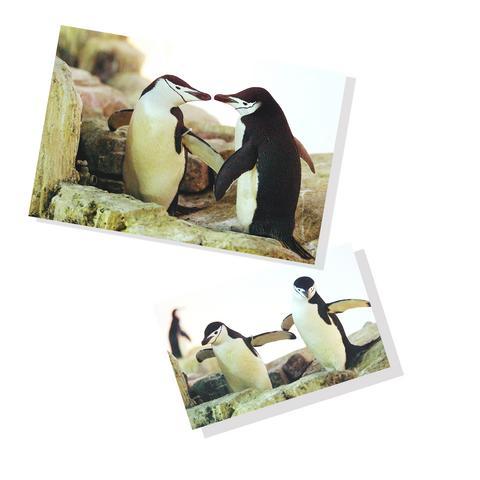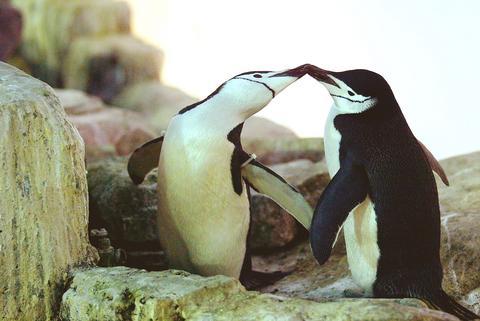Roy and Silo, two chinstrap penguins at the Central Park Zoo in Manhattan, are completely devoted to each other. For nearly six years now, they have been inseparable. They exhibit what in penguin parlance is called "ecstatic behavior": That is, they entwine their necks, they vocalize to each other, they have sex. Silo and Roy are, to anthropomorphize a bit, gay penguins. When offered female companionship, they have adamantly refused it. And the females aren't interested in them, either.
At one time, the two seemed so desperate to incubate an egg together that they put a rock in their nest and sat on it, keeping it warm in the folds of their abdomens, said their chief keeper, Rob Gramzay. Finally, he gave them a fertile egg that needed care to hatch. Things went perfectly. Roy and Silo sat on it for the typical 34 days until a chick, Tango, was born. For the next two and a half months they raised Tango, keeping her warm and feeding her food from their beaks until she could go out into the world on her own. Gramzay is full of praise for them.
"They did a great job," he said. He was standing inside the glassed-in penguin exhibit, where Roy and Silo had just finished lunch. Penguins usually like a swim after they eat, and Silo was in the water. Roy had finished his dip and was up on the beach.

PHOTO: NY TIMES
Roy and Silo are hardly unusual. Milou and Squawk, two young males, are also beginning to exhibit courtship behavior, hanging out with each other, billing and bowing. Before them, New York's Central Park Zoo had Georgey and Mickey, two female Gentoo penguins who tried to incubate eggs together. And Wendell and Cass, a devoted male African penguin pair, live at the New York Aquarium in Coney Island. Indeed, scientists have found homosexual behavior throughout the animal world.
This growing body of science has been increasingly drawn into charged debates about homosexuality in American society, on subjects from gay marriage to sodomy laws, despite reluctance from experts in the field to extrapolate from animals to humans. Gay groups argue that if homosexual behavior occurs in animals, it is natural, and therefore the rights of homosexuals should be protected. On the other hand, some conservative religious groups have condemned the same practices in the past, calling them "animalistic."
But if homosexuality occurs among animals, does that necessarily mean that it is natural for humans, too? And that raises a familiar question: If homosexuality is not a choice, but a result of natural forces that cannot be controlled, can it be immoral?

PHOTO: NY TIMES
The open discussion of homosexual behavior in animals is relatively new. "There has been a certain cultural shyness about admitting it," said Frans de Waal, whose 1997 book, Bonobo: The Forgotten Ape (University of California Press), unleashed a torrent of discussion about animal sexuality. Bonobos, apes closely related to humans, are wildly energetic sexually. Studies show that whether observed in the wild or in captivity, nearly all are bisexual, and nearly half their sexual interactions are with the same sex. Female bonobos have been observed to engage in homosexual activity almost hourly.
Before his own book, "American scientists who investigated bonobos never discussed sex at all," said de Waal, director of the Living Links Center of the Yerkes Primate Center at Emory University in Atlanta. "Or they sometimes would show two females having sex together, and would say, `The females are very affectionate.'"
Then in 1999, Bruce Bagemihl published Biological Exuberance: Animal Homosexuality and Natural Diversity (St. Martin's Press), one of the first books of its kind to provide an overview of scholarly studies of same-sex behavior in animals. Bagemihl said homosexual behavior had been documented in some 450 species. (Homosexuality, he says, refers to any of these behaviors between members of the same sex: long-term bonding, sexual contact, courtship displays or the rearing of young.) Last summer the book was cited by the American Psychiatric Association and other groups in a "friend of the court" brief submitted to the Supreme Court in Lawrence v. Texas, a case challenging a Texas anti-sodomy law. The court struck down the law.
Biological Exuberance was also cited in 2000 by gay rights groups opposed to Ballot Measure 9, a proposed Oregon statute prohibiting teaching about homosexuality or bisexuality in public schools. The measure lost.
In his book Bagemihl describes homosexual activity in a broad spectrum of animals. He asserts that while same-sex behavior is sometimes found in captivity, it is actually seen more frequently in studies of animals in the wild.
Among birds, for instance, studies show that 10 percent to 15 percent of female western gulls in some populations in the wild are homosexual. Females perform courtship rituals, like tossing their heads at each other or offering small gifts of food to each other, and they establish nests together. Occasionally they mate with males and produce fertile eggs but then return to their original same-sex partners. Their bonds, too, may persist for years.
Among mammals, male and female bottlenose dolphins frequently engage in homosexual activity, both in captivity and in the wild. Homosexuality is particularly common among young male dolphin calves. One male may protect another that is resting or healing from wounds inflicted by a predator. When one partner dies, the other may search for a new male mate. Researchers have noted that in some cases same-sex behavior is more common for dolphins in captivity.
Male and female rhesus macaques, a type of monkey, also exhibit homosexuality in captivity and in the wild. Males are affectionate to each other, touching, holding and embracing. Females smack their lips at each other and play games like hide-and-seek, peek-a-boo and follow the leader. And both sexes mount members of their own sex.
Paul L. Vasey, a professor of psychology and neuroscience at the University of Lethbridge in Canada, who studies homosexual behavior in Japanese macaques, is editing a new book on homosexual behavior in animals, to be published by Cambridge University Press. This kind of behavior among animals has been observed by scientists as far back as the 1700s, but Vasey said one reason there had been few books on the topic was that "people don't want to do the research because they don't want to have suspicions raised about their sexuality."
Some scientists say homosexual behavior in animals is not necessarily about sex. Marlene Zuk, a professor of biology at the University of California in Riverside and author of Sexual Selections: What We Can and Can't Learn About Sex From Animals (University of California Press, 2002), notes that scientists have speculated that homosexuality may have an evolutionary purpose, ensuring the survival of the species. By not producing their own offspring, homosexuals may help support or nurture their relatives' young. "That is a contribution to the gene pool," she said.
For Janet Mann, a professor of biology and psychology at Georgetown University, who has studied same-sex behavior in dolphin calves, their homosexuality "is about bond formation," she said, "not about being sexual for life."
She said that studies showed that adult male dolphins formed long-term alliances, sometimes in large groups. As adults, they cooperate to entice a single female and keep other males from her. Sometimes they share the female, or they may cooperate to help one male. "Male-male cooperation is extremely important," Mann said. The homosexual behavior of the young calves "could be practicing" for that later, crucial adult period, she added.
But, scientists say, just because homosexuality is observed in animals doesn't mean that it is only genetically based. "Homosexuality is extraordinarily complex and variable," Bagemihl said. "We look at animals as pure biology and pure genetics, and they are not." He noted that "the occurrence of same-sex behavior in animals provides support for the nurture side as well." He cited as an example the ruff, a type of Arctic sandpiper. There are four different classes of male ruffs, each differing from the others genetically. The two that differ most from each other are most similar in their homosexual behaviors.
Zuk said, "You have inclinations that are more or less supported by our genes and in some environmental circumstances get expressed." She used the analogy of right- or left-handedness, thought to be genetically based. "But you can teach naturally left-handed children to use their right hand," she pointed out.
Still, scientists warn about drawing conclusions about humans. "For some people, what animals do is a yardstick of what is and isn't natural," Vasey said. "They make a leap from saying if it's natural, it's morally and ethically desirable."
But he added: "Infanticide is widespread in the animal kingdom. To jump from that to say it is desirable makes no sense. We shouldn't be using animals to craft moral and social policies for the kinds of human societies we want to live in. Animals don't take care of the elderly. I don't particularly think that should be a platform for closing down nursing homes."
Bagemihl is also wary of extrapolating. "In Nazi Germany, one very common interpretation of homosexuality was that it was animalistic behavior, subhuman," he said.
What the animal studies do show, Zuk observed, is that "sexuality is a lot broader term than people want to think."
"You have this idea that the animal kingdom is strict, old-fashioned Roman Catholic," she said, "that they have sex just to procreate."
In bonobos, she noted: "you see expressions of sex outside the period when females are fertile. Suddenly you are beginning to see that sex is not necessarily about reproduction."
"Sexual expression means more than making babies," Zuk said. "Why are we surprised? People are animals."

“How China Threatens to Force Taiwan Into a Total Blackout” screamed a Wall Street Journal (WSJ) headline last week, yet another of the endless clickbait examples of the energy threat via blockade that doesn’t exist. Since the headline is recycled, I will recycle the rebuttal: once industrial power demand collapses (there’s a blockade so trade is gone, remember?) “a handful of shops and factories could run for months on coal and renewables, as Ko Yun-ling (柯昀伶) and Chao Chia-wei (趙家緯) pointed out in a piece at Taiwan Insight earlier this year.” Sadly, the existence of these facts will not stop the

Taiwan is one of the world’s greatest per-capita consumers of seafood. Whereas the average human is thought to eat around 20kg of seafood per year, each Taiwanese gets through 27kg to 35kg of ocean delicacies annually, depending on which source you find most credible. Given the ubiquity of dishes like oyster omelet (蚵仔煎) and milkfish soup (虱目魚湯), the higher estimate may well be correct. By global standards, let alone local consumption patterns, I’m not much of a seafood fan. It’s not just a matter of taste, although that’s part of it. What I’ve read about the environmental impact of the

It is jarring how differently Taiwan’s politics is portrayed in the international press compared to the local Chinese-language press. Viewed from abroad, Taiwan is seen as a geopolitical hotspot, or “The Most Dangerous Place on Earth,” as the Economist once blazoned across their cover. Meanwhile, tasked with facing down those existential threats, Taiwan’s leaders are dying their hair pink. These include former president Tsai Ing-wen (蔡英文), Vice President Hsiao Bi-khim (蕭美琴) and Kaohsiung Mayor Chen Chi-mai (陳其邁), among others. They are demonstrating what big fans they are of South Korean K-pop sensations Blackpink ahead of their concerts this weekend in Kaohsiung.

The captain of the giant Royal Navy battleship called his officers together to give them a first morsel of one of World War II’s most closely guarded secrets: Prepare yourselves, he said, for “an extremely important task.” “Speculations abound,” one of the officers wrote in his diary that day — June 2, 1944. “Some say a second front, some say we are to escort the Soviets, or doing something else around Iceland. No one is allowed ashore.” The secret was D-Day — the June 6, 1944, invasion of Nazi-occupied France with the world’s largest-ever sea, land and air armada. It punctured Adolf